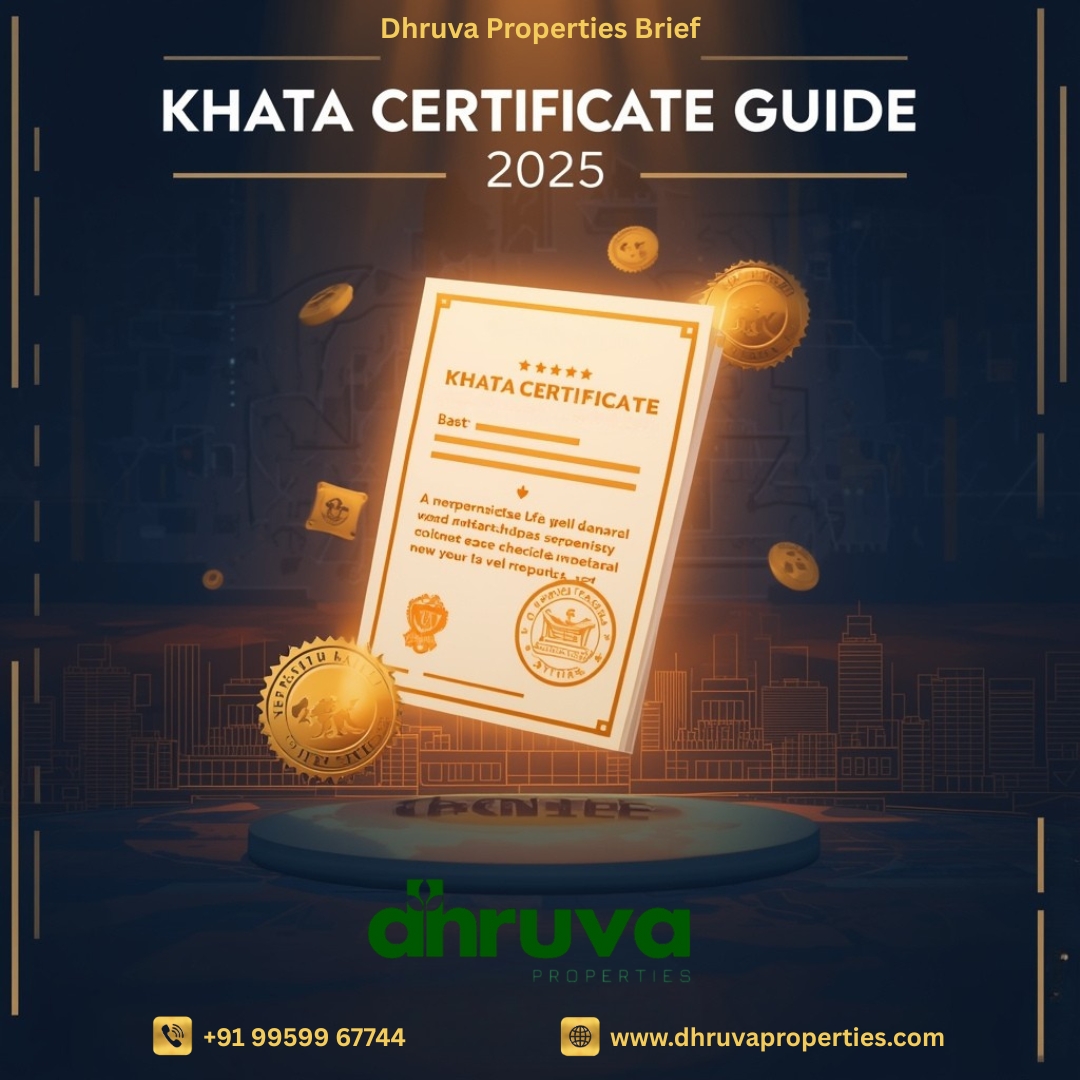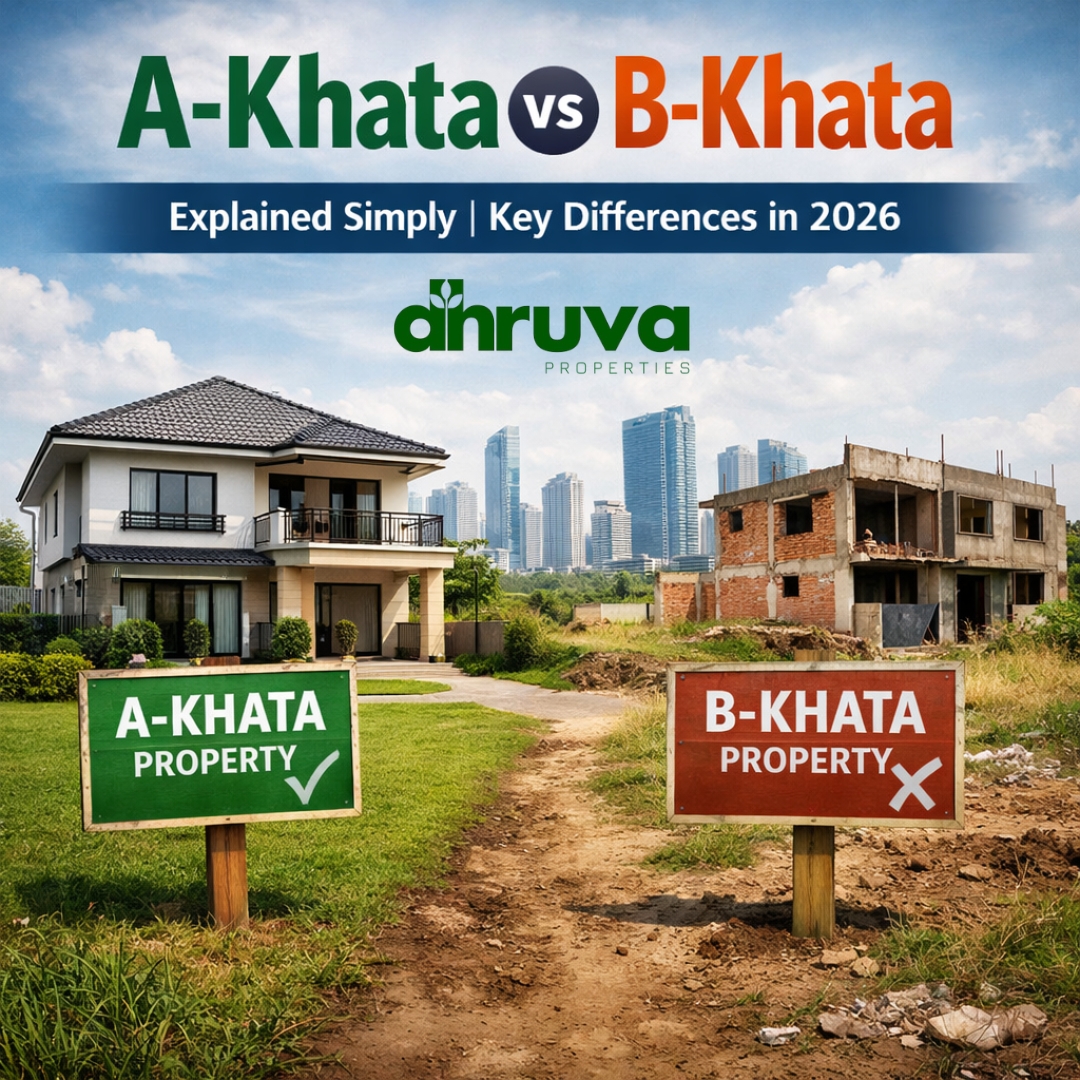What is Khata Certificate and How to Get It for Your Site | Dhruva Properties 2025 Brief

Why Khata Certificate Matters for Your Gauribidanur & Hindupur Investment
If you're investing in land around Gauribidanur or Hindupur, understanding property documentation isn't optional anymore. It's the foundation of smart investing. The Khata certificate stands as one of the most crucial documents you'll encounter, and frankly, most first-time buyers don't realize its importance until it's too late.
Here's what makes this document absolutely essential for your investment:
1. Legal Proof of Ownership and Tax Records
Your Khata certificate acts as official acknowledgment from local authorities that you own the property. It's not just a paper—it's your connection to the municipal or gram panchayat records. Without it, you're essentially invisible in the government's eyes when it comes to property ownership. In growing areas like Gauribidanur and Hindupur, where land values are rapidly appreciating, having this documentation from day one protects your investment and establishes your legal standing.
2. Essential for Future Construction and Loan Approvals
Planning to build your dream home or develop the land commercially? Banks and financial institutions won't even consider your loan application without a proper Khata certificate. This document proves that your property exists in municipal records and that all previous tax obligations have been met. Given that Gauribidanur is emerging as a major investment hub, having clean documentation ensures you can act quickly when opportunities arise.
3. Mandatory for Property Tax Payments and Civic Amenities
You can't pay property taxes without a Khata certificate, and you can't access basic civic services without proper tax records. As both Gauribidanur and Hindupur develop rapidly with better infrastructure, properties with complete documentation will have seamless access to water connections, sewage systems, and electricity upgrades. The municipal bodies use Khata records to identify properties and deliver services.
4. Crucial for Property Resale and Transfer
When you eventually decide to sell or transfer your property, the first thing potential buyers will ask for is the Khata certificate. Properties without this documentation face significant price reductions—sometimes 15-20% below market value—simply because buyers know they'll inherit documentation headaches. In fast-moving markets, clean paperwork means faster sales at better prices.
5. Protects Against Fraudulent Claims and Disputes
In developing areas where land values are surging, property disputes aren't uncommon. Your Khata certificate, registered with local authorities, creates an official record that's hard to dispute. It's your shield against fraudulent claims and boundary disputes. When you're investing in real estate in these emerging corridors, this protection becomes invaluable.
The bottom line? If you're serious about investing in Gauribidanur or Hindupur, treating the Khata certificate as an afterthought could cost you thousands—or even jeopardize your entire investment.
Step-by-Step Process: How to Get Khata Certificate for Your Property in 2025
Getting your Khata certificate isn't as intimidating as it sounds. The process has actually become more streamlined in recent years, especially with online systems now in place. Here's exactly how to navigate it:
Step 1: Determine Which Authority Handles Your Property
First, figure out whether your property falls under municipal corporation limits or gram panchayat jurisdiction. This determines where you'll apply and which specific procedures you'll follow.
For most Gauribidanur properties, you'll be dealing with the Gauribidanur Town Municipal Council. Hindupur properties typically fall under Hindupur Municipality in Andhra Pradesh. However, if your property is in surrounding village areas, you'll work with the respective gram panchayat.
You can verify jurisdiction by checking your sale deed or visiting the local municipal office with your survey number. The staff can immediately tell you which authority manages your property records.
Step 2: Gather Required Documents
Documentation is crucial. Missing even one document can delay your application by weeks. Here's your complete checklist:
Essential Documents:
- Sale deed (registered document proving you purchased the property)
- Previous Khata certificate or records (if available from previous owner)
- Encumbrance certificate (proving no legal dues on the property)
- Property tax paid receipts (if previous taxes were paid)
- Property mutation certificate (showing transfer of ownership)
- Possession certificate or allotment letter (if buying from a developer)
- Survey number details and property sketch
- Identity proof (Aadhar card, PAN card, passport)
- Address proof (matching documents showing current residence)
- Recent passport-size photographs
Additional Documents That Strengthen Your Application:
- Approved building plan (if the property has one)
- Occupancy certificate (for constructed properties)
- Conversion certificate (if land was converted from agricultural to residential)
- DTCP approval documents (for properties in approved layouts)
- Land use certificate
Make copies of everything. Submit copies and carry originals for verification. This saves you from having to return multiple times.
Step 3: Submit Application Online or Offline
Online Application Process:
Most municipal bodies now offer online Khata application systems. For properties in Gauribidanur, you'll typically use the Karnataka government's Sakala services portal or the local municipal website.
- Create an account on the relevant portal
- Select "New Khata Certificate" or "Khata Transfer" application
- Fill in all property details accurately
- Upload scanned copies of all required documents
- Pay the application fee online (usually between ₹200-₹500)
- Note down your application reference number
The online system gives you complete transparency. You can track your application status, see which stage it's at, and identify if any documents are pending.
Offline Application Process:
If you prefer the traditional route or if online systems aren't functioning properly:
- Visit the municipal office or gram panchayat office during working hours
- Collect the Khata application form from the revenue section
- Fill in all details carefully and legibly
- Attach all required documents with the form
- Submit at the designated counter
- Pay the application fee and collect your receipt
- Get your acknowledgment slip with application number
Keep that acknowledgment slip safe. It's your proof of application and the reference you'll use for follow-ups.
Step 4: Property Inspection and Verification
Once you submit your application, the municipal body initiates a verification process. This is where the actual work happens.
A revenue inspector or survey officer will be assigned to your case. They'll schedule a site visit—usually within 15-30 days of application submission. Be present during this inspection or send an authorized representative who knows the property details.
During the inspection, the officer will:
- Verify physical property boundaries match the documents
- Check if the property location corresponds to the survey number provided
- Confirm no encroachments or unauthorized structures exist
- Take photographs and measurements for records
- Interview neighbors about boundary clarity (sometimes)
- Verify that you're actually in possession of the property
This inspection is crucial. If the officer finds discrepancies between your documents and the actual site, your application will face delays or rejection. Make sure your property boundaries are clearly marked before the inspection.
The inspector will also check for any existing dues or tax arrears on the property. If previous owners haven't paid taxes, you might need to clear those dues before your Khata gets approved.
Step 5: Document Verification and Processing
After the physical inspection, your application moves to the document verification stage. The municipal office will cross-check:
- Your sale deed against sub-registrar records
- Previous ownership records to ensure clean title transfer
- Tax payment history and any pending dues
- Legal status of the property (no court cases or disputes)
- Compliance with land use regulations
This stage typically takes 2-4 weeks. If everything checks out, your application moves toward approval. If they find issues, you'll receive a notice asking for clarification or additional documents.
Respond to any queries immediately. Each delay pushes your approval further down the timeline.
Step 6: Approval and Khata Certificate Issuance
Once verification is complete and all checks pass, the concerned authority approves your Khata certificate. You'll receive notification—either through SMS, email, or by checking your application status online.
The final Khata certificate gets generated with your unique Khata number. This number becomes your property's permanent identifier in municipal records.
You can collect the physical certificate from the municipal office, or in some cases, download a digitally signed copy from the online portal. Both versions are legally valid.
Your property is now officially in your name in the municipal records. The Khata certificate shows you as the current owner, and you're set up for property tax payments going forward.
Step 7: Set Up Property Tax Payments
With your Khata certificate in hand, immediately set up your property tax payment system. Most municipalities now offer online tax payment options.
Register your Khata number in the property tax portal. Set up reminders for annual or semi-annual tax payments (depending on local rules). Paying taxes on time keeps your Khata status active and prevents complications if you ever need to update information or transfer ownership.
Keep all tax payment receipts. These become important documents for future transactions, loan applications, and proving your property's legal status.
Timeline and Costs: What to Realistically Expect
Let's talk about the practical aspects—how long this takes and what it costs.
Processing Time
In 2025, with improved systems and digitization, the Khata certificate process has become faster than before. Here's what you can typically expect:
Ideal Timeline (When Everything Goes Smoothly):
- Application submission to acknowledgment: 1-2 days
- Site inspection scheduling: 7-15 days
- Physical verification completion: 1-3 days
- Document verification: 10-20 days
- Approval and certificate issuance: 5-7 days
Total time in best-case scenario: 25-45 days
Realistic Timeline (With Minor Delays):
- Complete process: 60-90 days
Extended Timeline (If Issues Arise):
- If documents need corrections: Add 2-4 weeks
- If boundary disputes surface: Add 1-3 months
- If previous tax dues need clearing: Add 2-6 weeks
- If property requires regularization: Add 3-6 months
In Gauribidanur and Hindupur, where administrative systems are still developing alongside the areas themselves, expect timelines closer to the realistic or extended ranges.
Associated Costs
The financial outlay for obtaining a Khata certificate is quite reasonable:
Official Fees:
- Application fee: ₹200-₹500
- Inspection charges: ₹100-₹300
- Certificate issuance: ₹100-₹200
- Document verification: Usually included in application fee
Additional Costs You Might Encounter:
- Previous tax dues clearance: Depends on arrears (could be ₹1,000-₹50,000+)
- Document preparation help: ₹500-₹2,000 if you hire someone
- Legal consultation: ₹2,000-₹10,000 if complications arise
- Property survey (if needed): ₹3,000-₹15,000
Total typical cost for straightforward cases: ₹1,000-₹5,000
If you're dealing with complicated property history or need to clear significant previous dues, costs can escalate. However, for most properties in approved layouts in Gauribidanur and Hindupur, you're looking at the lower end of these ranges.
Tips to Speed Up the Process
Want to move things along faster? Here's what actually works:
Be Proactive with Follow-ups: Don't just submit and forget. Check your application status weekly. If the inspection hasn't been scheduled within three weeks, visit the office and politely inquire. Sometimes applications sit in queues simply because no one's paying attention.
Ensure Document Accuracy: Double-check every document before submission. One wrong survey number or mismatched name spelling can delay everything by weeks. Have a lawyer or documentation expert review your paperwork if you're unsure.
Be Present for Inspection: When the inspector schedules the site visit, be there personally. Answer questions clearly, have all documents ready, and address any concerns immediately. Inspections that require follow-up visits automatically add weeks to your timeline.
Clear Dues Immediately: If you discover previous tax arrears, pay them right away. Don't wait for official notices. This single action can cut several weeks from your approval time.
Use Online Systems When Available: Online applications typically move faster than offline ones because they're tracked systematically and have built-in timelines for each stage.
Maintain Communication: Keep your phone number and email updated in the application. Missing a call from the inspector or not receiving a document query notice can stall everything.
Common Challenges and How to Solve Them
Even with perfect preparation, you might hit roadblocks. Here are the most common issues and practical solutions:
Challenge 1: Property Survey Number Mismatch
Sometimes your sale deed survey number doesn't match municipal records. This happens when properties have been resurveyed or when boundaries were redrawn for development.
Solution: Obtain a certified survey from a licensed surveyor. Take this survey report along with your sale deed to the municipal office and request a correction. You might need to submit a separate application for survey number correction before proceeding with the Khata application. Budget an extra 4-6 weeks for this.
Challenge 2: Previous Owner's Pending Taxes
You discover the previous owner never paid property taxes, and now those dues are attached to the property.
Solution: Check the exact amount of dues during the initial stages of your Khata application. Legally, as the current owner, you're responsible for clearing these. Pay the dues and get official receipts. Attach these receipts to your Khata application as proof of clearance. Some buyers negotiate with sellers to compensate them for unexpected tax dues—include clauses about this in your purchase agreement if buying new property.
Challenge 3: Incomplete Documentation from Previous Owner
The person who sold you the property didn't have complete records or a previous Khata certificate.
Solution: Start with what you have—primarily your registered sale deed. Request an encumbrance certificate from the sub-registrar office for the past 30 years. This shows the property's ownership history and can substitute for some missing documents. If the property was agricultural land being converted, get the conversion order from the appropriate authority. Explain the documentation gap in your application and provide an affidavit stating facts. Municipal authorities understand that older properties might not have complete paper trails.
Challenge 4: Boundary Disputes with Neighbors
During the inspection, a neighbor claims your boundary extends into their property, or vice versa.
Solution: Never ignore boundary disputes—they'll kill your Khata application. Arrange a joint survey with the neighbor present. Hire a licensed surveyor acceptable to both parties. If the survey confirms your boundaries are correct, get a written statement from the neighbor or proceed with the surveyor's report. If there's a genuine encroachment issue, resolve it before pursuing the Khata certificate. This might mean negotiating with the neighbor, adjusting boundaries, or in worst cases, involving legal mediation. Document every step of the resolution.
Challenge 5: Property Falls Under Multiple Jurisdictions
Your property sits on a border area where municipal and panchayat limits overlap, or between two administrative units.
Solution: Visit both offices and determine the official jurisdiction based on survey records. Sometimes properties near boundaries are in transitional zones—they might be scheduled for municipal inclusion but currently under panchayat control. Get written clarification on which authority you should approach. Apply to the correct body and include documentation proving jurisdiction. If there's genuine confusion, a lawyer's consultation becomes worthwhile here.
Challenge 6: Property Was Part of Unapproved Layout
You discover the layout where you bought wasn't officially approved when development started, though it might be getting regularized.
Solution: Check the current status with the local planning authority. Many older layouts in developing areas undergo regularization processes. If your layout is in regularization proceedings, wait for that to complete before applying for Khata—it'll be much smoother. If it's not being regularized, consider whether the property can be individually regularized. Sometimes individual sites can get proper documentation even when the entire layout doesn't. This requires legal help, but it's often possible.
Challenge 7: Agricultural Land Classification Still Active
Your property is legally classified as agricultural land even though you intend residential use.
Solution: Before applying for Khata, apply for land conversion from agricultural to residential or commercial use (depending on your plan). Contact the appropriate conversion authority—usually the District Collector's office or Revenue Department. Submit your conversion application with necessary documents proving the land falls in an area permitted for such conversion. Conversion typically takes 2-4 months and involves additional fees (usually calculated per acre). Only after receiving the conversion order should you proceed with the Khata application. Trying to get Khata for agricultural land for residential use will result in rejection.
Special Considerations for Gauribidanur and Hindupur Properties
Investing in emerging locations brings unique considerations. Both Gauribidanur and Hindupur are transitioning from primarily agricultural regions to mixed-use areas with significant residential and commercial development.
Jurisdictional Changes to Watch
Both areas are experiencing administrative evolution. As development intensifies, village panchayats often get upgraded to town panchayats, which then become municipal councils, and eventually municipal corporations.
This matters for your Khata certificate because jurisdiction changes require record transfers. If you get your Khata from a gram panchayat today, and that area gets absorbed into a municipality next year, you'll need to get your Khata transferred to the new authority.
The good news? These transfers are usually administrative procedures rather than full reapplications. Keep track of local governance changes and proactively transfer your records when jurisdiction changes occur.
Infrastructure Development Impact
Major infrastructure projects around both locations—like highway expansions, airport proximity in Gauribidanur's case, and industrial development in both areas—affect property documentation requirements.
Properties near proposed highways or industrial zones might face additional scrutiny during the Khata process. Authorities want to ensure proper documentation before major development hits the area. This doesn't make getting Khata harder, but it does mean more careful verification.
If your property falls in a notification zone for any major project, disclose this during your application. Transparency here prevents complications later.
Dealing with Agricultural Conversion
A significant portion of land in both Gauribidanur and Hindupur is converting from agricultural to residential use. If you're buying recently converted land or land that still carries agricultural classification, understand the conversion process.
Agricultural land in Karnataka requires approval from the Deputy Commissioner for conversion to residential or commercial use. The process involves:
- Application with property details and intended use
- Site inspection by revenue officials
- Payment of conversion fee (varies by location and land value)
- Publication of the proposal for public objections
- Final conversion order issuance
Only after receiving the conversion order should you pursue residential Khata. Attempting to get residential Khata on unconverted agricultural land results in rejection.
Many developers handle conversions before selling plots. Always verify conversion status before purchasing, and ensure the conversion order is transferred to your name after purchase.
Title Verification is Critical
In rapidly developing areas, title clarity becomes even more important. Before even starting your Khata application, ensure your title is absolutely clean.
Get a comprehensive title verification done by a qualified lawyer. This should include:
- 30-year encumbrance certificate
- Verification of all previous sale deeds in the chain
- Confirmation that no legal disputes or court cases exist
- Verification of proper inheritance documentation if property passed through generations
- Confirmation of land conversion status
Finding and fixing title issues before applying for Khata saves enormous hassle. Many Khata application rejections stem from title problems that could have been resolved beforehand.
Why Professional Help Might Be Worth It
While you can definitely handle the Khata certificate process independently, certain situations justify professional assistance.
When to Consider Hiring Help
Complicated Property History: If your property has changed hands multiple times, has murky documentation, or involves inheritance issues, a legal professional familiar with local procedures can navigate these complexities efficiently.
Time Constraints: If you're not local to Gauribidanur or Hindupur and can't easily make multiple visits to municipal offices, hiring a local property documentation service makes sense. They handle submissions, follow-ups, and inspections on your behalf.
Language Barriers: If you're not comfortable with Kannada or Telugu (depending on location) and the local officials primarily operate in these languages, a translator or documentation agent bridges the communication gap.
Previous Rejections: If you've already had a Khata application rejected and don't fully understand why, professional help in reapplying with corrections can be valuable.
Types of Professional Help Available
Property Documentation Agents: These specialists handle all paperwork, submissions, and follow-ups. They typically charge ₹3,000-₹10,000 depending on case complexity. They're useful for straightforward cases where you just need someone to manage the process.
Property Lawyers: For complicated cases involving title issues, boundary disputes, or legal complications, a property lawyer becomes necessary. Their fees range from ₹10,000-₹50,000+ depending on complexity and reputation. They provide legal advice, represent you if needed, and ensure all documentation is legally sound.
Licensed Surveyors: If you need property surveys for boundary verification or to resolve disputes, licensed surveyors charge ₹3,000-₹15,000 depending on property size and complexity.
What Professional Help Cannot Do
Understand that professionals can guide and assist, but they cannot:
- Magically create documents that don't exist
- Make an illegal property suddenly legal
- Bypass verification processes
- Guarantee approval if legitimate issues exist with the property
Be wary of anyone promising guaranteed approvals or shortcuts. The Khata process has standard procedures that must be followed.
Maintaining Your Khata Certificate After You Get It
Getting the Khata certificate isn't the end—it's the beginning of your ongoing relationship with municipal records.
Annual Property Tax Compliance
Your Khata certificate establishes you in the property tax system. Pay your property taxes on time every year. Late payments accumulate penalties and can create issues if you later want to update your Khata, transfer it, or use it for loan applications.
Set up automatic reminders for tax payment dates. Most municipal bodies now offer online payment systems that send SMS and email reminders.
Updating Khata for Changes
You'll need to update your Khata certificate for various changes:
Ownership Transfer: When you sell the property, the new owner needs to transfer the Khata to their name. This is called Khata mutation. You'll need the new sale deed and buyer's documents. The process is similar to getting a new Khata but typically faster.
Property Modifications: If you significantly modify the property—adding floors, changing structures, subdividing land—update your Khata to reflect these changes. This ensures your tax assessment remains accurate and you avoid complications later.
Name or Address Changes: If your personal details change (name after marriage, address update), reflect these in your Khata records. While not legally mandatory, it prevents confusion in future transactions.
Keeping Documents Safe
Your Khata certificate is a valuable document. Keep multiple copies:
- Original in a safe place (bank locker or fireproof home safe)
- Digital scanned copy in cloud storage
- Physical copies for regular use
Never hand over your original Khata certificate to anyone unless absolutely necessary (like for loan processing at a bank). Use certified copies for routine purposes.
Periodic Verification
Every few years, verify that your Khata records in the municipal system match your certificate. Errors sometimes creep into digital records during system updates or migrations.
Visit the municipal office or check online portals to ensure your details remain accurate. Catching and correcting errors early prevents major problems later.
Final Thoughts: Making Your Property Investment Secure
Here's the reality: in 2025, buying land in emerging areas like Gauribidanur and Hindupur offers tremendous opportunity, but only if you handle documentation correctly from day one.
Your Khata certificate isn't just another bureaucratic paper—it's the foundation of your property's legal status. It's what transforms a piece of land from being "something you bought" to being "something you legally, officially, provably own with full rights."
Yes, the process involves paperwork. Yes, it takes time. Yes, you might encounter minor obstacles along the way. But every single hour you invest in getting your Khata certificate sorted properly is an hour protecting potentially lakhs of rupees in property value.
Think about what your property represents—probably years of savings, maybe your family's future security, possibly your retirement plan. Treating its documentation casually is like buying a car and never bothering to get it registered. It might work temporarily, but eventually, it will create serious problems.
The markets in Gauribidanur and Hindupur are heating up. Infrastructure development, improved connectivity, and growing demand mean property values here are on an upward trajectory. But properties with clean, complete documentation will always command premium prices and sell faster than those with paperwork problems.
Start your Khata certificate process immediately after purchasing property. Don't convince yourself you'll "do it later" or "handle it when needed." Later becomes never, and when you actually need it—for construction permission, for a loan, for sale—you'll face time pressure that makes everything harder.
If you've already been delaying, today is the day to begin. Gather your documents, visit your local municipal office or their website, and start the application. The process is more manageable than you think, especially if you approach it systematically.
And if you're still considering buying land in these areas, make Khata eligibility and documentation clarity major factors in your decision. Ask sellers about Khata status. Verify jurisdiction. Understand conversion requirements. Build these considerations into your purchase negotiations.
Your investment deserves protection. Your family's future deserves security. Your property deserves proper documentation. The Khata certificate provides all three.
Ready to Invest in Properly Documented Properties?
At Dhruva Properties, we understand that successful real estate investment goes beyond just finding the right location—it's about ensuring every legal aspect is handled correctly from the start.
All our properties in Gauribidanur and Hindupur come with clear title verification, proper conversion documentation, and full support in obtaining Khata certificates. We don't just sell you land; we ensure you have every document you need to build your future confidently.
Whether you're a first-time buyer wondering if Gauribidanur is really the next Devanahalli, trying to understand why everyone's rushing to buy land in these locations, or ready to unlock your financial future through real estate investment, we're here to guide you through every step—including the crucial documentation process.
Contact Dhruva Properties today to explore investment opportunities where legal clarity meets growth potential. Because your peace of mind matters as much as your returns.
Invest smart. Invest secure. Invest with proper documentation.









